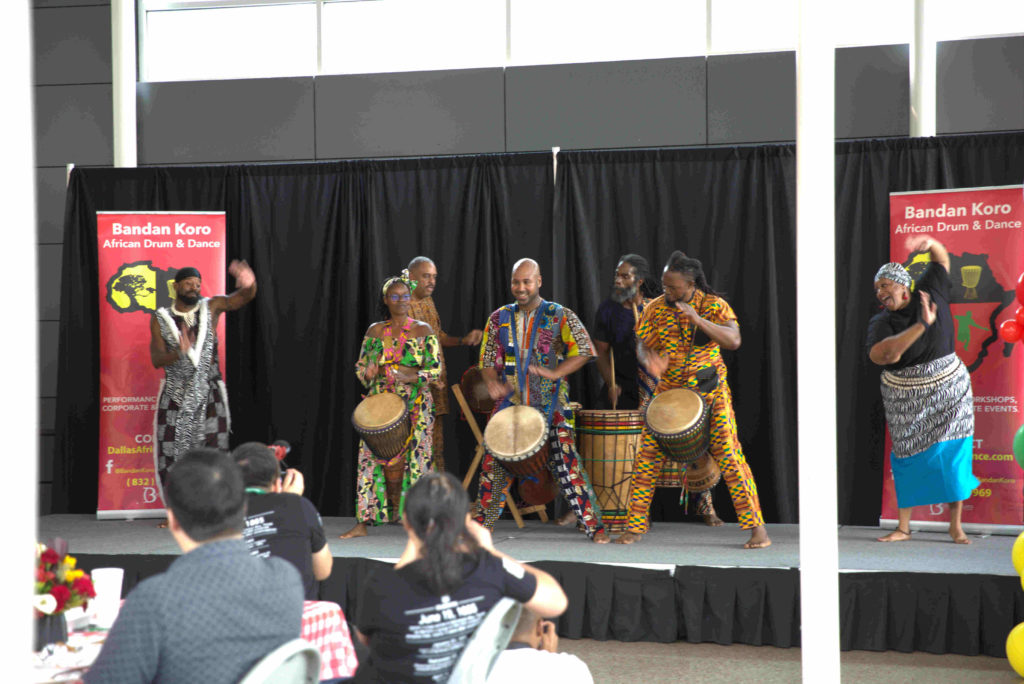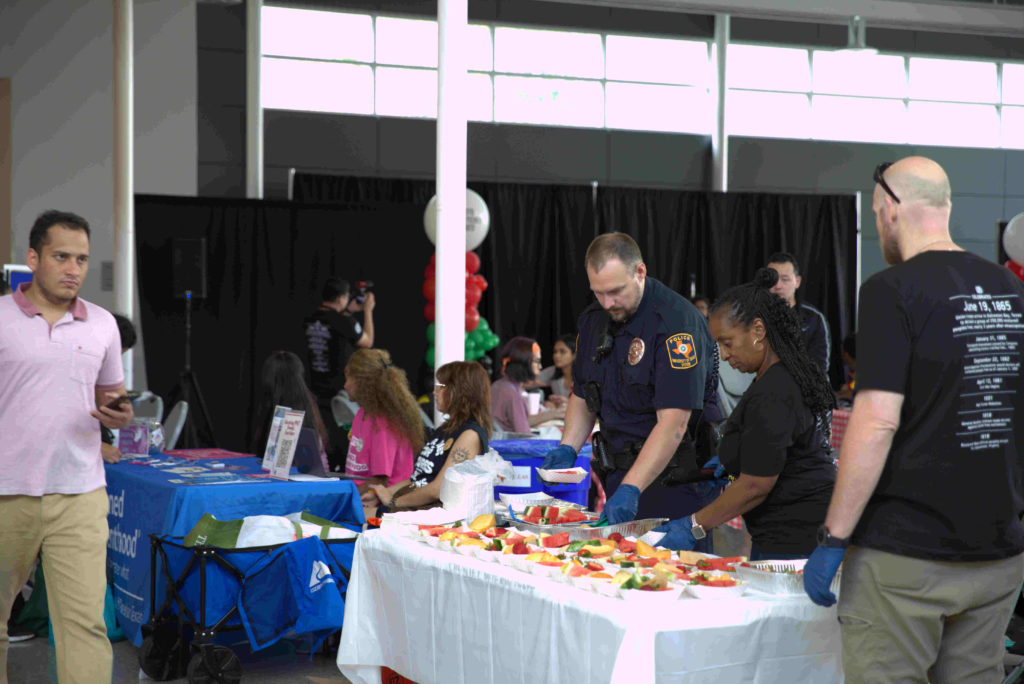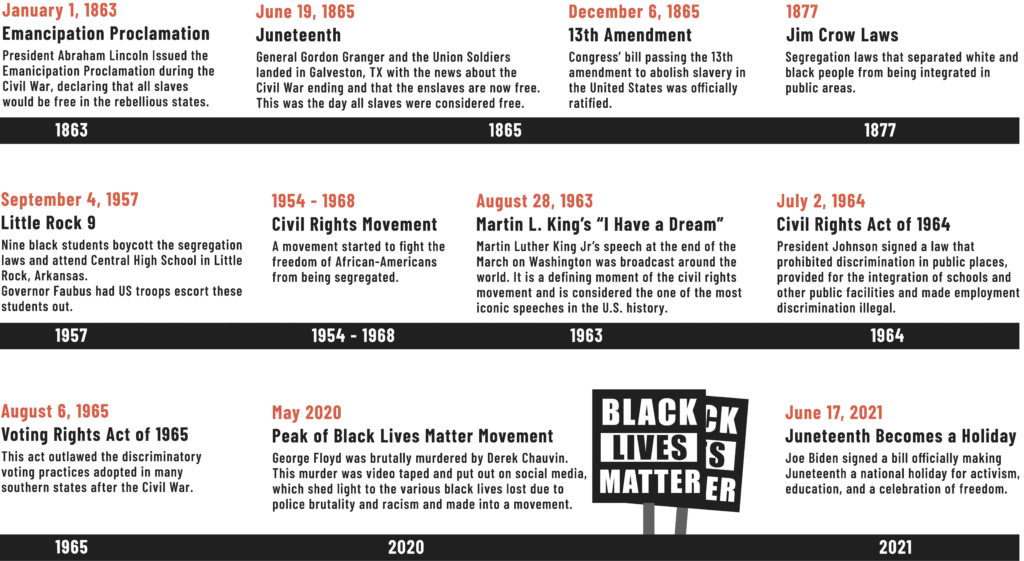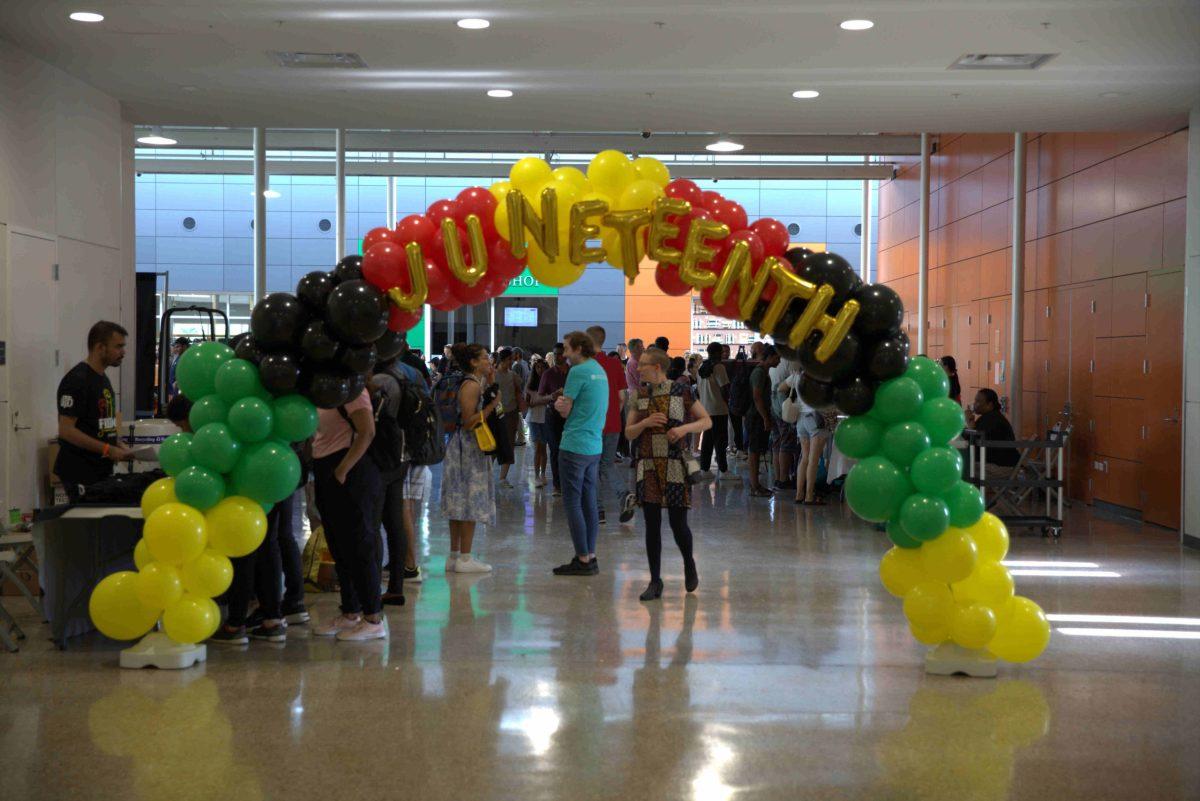
with food, music and dance. The performing African drum ensemble, Bandan Koro, even invited members of the crowd
to dance with them.
On June 15, several UTD organizations took part in a celebration for Juneteenth, which was made a federal holiday in 2021. Featuring food, music and dance along with volunteering and tributes, the event honored the history of black Americans.
The day started off with a service project hosted by the Office of Student Volunteerism and the Multicultural Center. Named the Bruce August Jr. Juneteenth Day of Service, in honor of UTD’s former Multicultural Center director who passed away in April, the project allowed Comets to pack meals for struggling families. Yvette Pearson, vice president for diversity, equity and inclusion, said this year’s Juneteenth celebration was held in memory of August.
“One thing I like about what we’ve been able to do with this celebration is really honor Bruce’s legacy and what he brought to making this event and this holiday a reality on our campus,” Pearson said, “Bruce was a man who exemplified community. He exemplified integrity. He was one of those people who was all things to all people. And we saw it when he was here with us, but we saw it even more when he wasn’t here anymore.”
Tributes to August were made throughout the day by students and staff alike. The importance of his presence at UTD became clearer as the event progressed. Juneteenth at UTD commemorated his legacy by emphasizing community- the celebration was a joint effort made by many organizations, including the Black Faculty and Staff Alliance, the Office of Diversity, Equity, and Inclusion, the Student Union and more, along with aid from the McDermott Library, UTDPD, and the Center for Students in Recovery.
“It’s about bringing folks together,” Pearson said. “As I mentioned, it’s been a day of events and we’ve had partnerships withso many different offices that have come together to play some role … So it’s about not just the Multicultural Center who’s leading this event, but how we bring each other together to advance our goals.”
The main celebration took place from 5– 7 p.m. in the Visitor Center atrium. Speeches were given by members who planned the event, after which Pearson sang “Lift Every Voice and Sing,” a hymn that symbolizes liberation for African Americans. Soul food, or traditionally African American food, was served to attendees, including macaroni and cheese, mashed potatoes and gravy. One of the most memorable parts of the event was a musical dance performance by Bandan Koro, an African drum and dance ensemble. Towards the end of their performance, the ensemble even invited members of the crowd to dance with them, exemplifying the diversity and community of UTD.
“We’re a campus of people with so many richly diverse identities, of course,” Pearson said. “And for us to learn more about each other’s cultures and histories, it’s really important to help us create an environment where we can all thrive together. So, one of the biggest things that comes out of these types of events is the education. And that comes from more than just learning history or whatever. It comes from celebrating the culture.”

A brief history of Juneteenth
Juneteenth was celebrated long before it was declared a national holiday. On Jan. 1, 1863, President Abraham Lincoln issued the Emancipation Proclamation, which declared that all slaves were now free. It was not until two years later on June 19, 1865 that slaves in Galveston, Texas were told that slavery was abolished. These freed slaves were also told to spread the word that they could live freely without being bound to an owner or being a part of their labor force. After the Civil War ended, Texas was the last Confederate state that recognized emancipation.
This official abolition of slavery named Juneteenth was just recently made into a national holiday in June of 2021, commemorating the freedom of slaves. Since then, Juneteenth is celebrated throughout America and is used to appreciate black American culture.
Activist Opal Lee is known as the “Grandmother of Juneteenth”, being one of the catalysts of making Juneteenth a national holiday since 2016.
“This story has to center on North Texas’s own Opal Lee,” said UTD history professor Ben Wright. “No one did more to make this state holiday into a national movement. Opal Lee was a teacher in Fort Worth and then spent her retirement as an activist fighting for racial equality and for federal recognition of Juneteenth.”
According to the Juneteenth Legacy Project which she is a co-chair to, Lee fought for Juneteenth to become a holiday to bring awareness to Congress about the importance and need of unity that the abolition of slavery can bring.
Since slavery was a big part of Texas history, according to Wright, the Dallas metroplex has some history of slavery as well.
“In the 1920s, the Ku Klux Klan had a resurgence and one of the most important leaders in this era of the organization was W.A. Criswell, the pastor of First Baptist Church Dallas. One out of every three white men in Dallas belonged to the KKK,” said Wright.
Despite this twisted past, Juneteenth gave black Texans freedom, which they now celebrate in honor of their fight for it.
“Juneteenth is so important to me personally because history is under attack. We see politicians, particularly in Florida and Texas, trying to whitewash our history of its difficult truth,” said Wright. “We ought to celebrate a meaningful moment that expanded freedom, we ought to commemorate the struggle that secured that expansion of freedom, and we ought to renew our commitment to continue fighting the legacies of white supremacy in our world today.”
Wright reiterated that Juneteenth has three functions: celebration, commemoration and commitment to equality.
“In order to commemorate Juneteenth, take the time to educate yourself on American history,” said Wright. “In order to understand emancipation, we need to understand both slavery and the backlash to liberty that occurred in the aftermath of emancipation. Finally, Juneteenth invites us to understand and fight the racial inequity that still haunts our world today.”

Juneteenth celebrates more than the end of slavery. It recognizes years of black Americans’ struggle for freedom, equality and justice, even in our current time.





